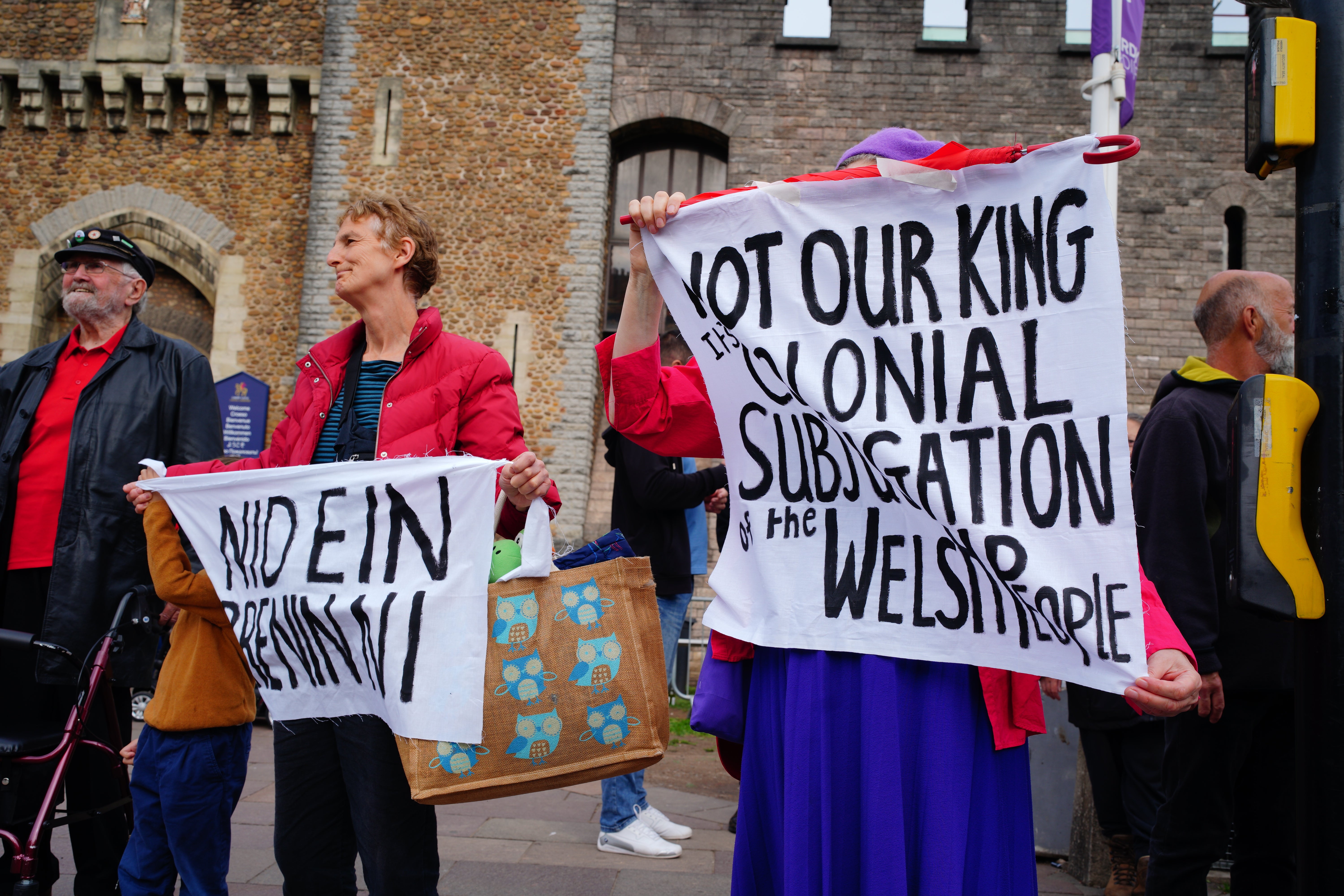Charges against heckler who shouted ‘who elected him?’ at King Charles proclamation dropped
Symon Hill considering legal action against police to protect ‘right to resist the monarchy’
Your support helps us to tell the story
From reproductive rights to climate change to Big Tech, The Independent is on the ground when the story is developing. Whether it's investigating the financials of Elon Musk's pro-Trump PAC or producing our latest documentary, 'The A Word', which shines a light on the American women fighting for reproductive rights, we know how important it is to parse out the facts from the messaging.
At such a critical moment in US history, we need reporters on the ground. Your donation allows us to keep sending journalists to speak to both sides of the story.
The Independent is trusted by Americans across the entire political spectrum. And unlike many other quality news outlets, we choose not to lock Americans out of our reporting and analysis with paywalls. We believe quality journalism should be available to everyone, paid for by those who can afford it.
Your support makes all the difference.The prosecution of a man who shouted “who elected him?” during a proclamation ceremony for King Charles III has been dropped.
Symon Hill was arrested during an official event in Oxford that followed the Queen’s death in September, during a string of controversial police interventions against republican protesters.
Mr Hill, 45, said he was initially told to “be quiet” by security guards before police officers approached and handcuffed him.
Thames Valley Police launched an investigation and Mr Hill was charged under the Public Order Act shortly before Christmas, with a summons to appear in court later this month.
But on Monday, he received a letter from the Crown Prosecution Service (CPS) saying the case had been dropped because there was insufficient evidence to provide a realistic prospect of conviction.
Mr Hill, who works for the pacifist Peace Pledge Union, told The Independent: “It’s all been a bit of a surprise but I’ve given up being surprised after all the twists and turns.
“I was charged on 22 December, and the letter from the CPS was dated 5 January.
“It was a very quick decision, which does raise further questions about what motivated the charge if it wasn’t a realistic case.”
Mr Hill said he was taking legal advice about the possibility of a claim against Thames Valley Police for unlawful arrest and was concerned about potential action against hecklers around the coronation in May.
“It’s not just about me, it’s about everybody’s right to voice dissent,” he added. “It’s about free expression and the right to resist the monarchy.”
Mr Hill had been due to appear at Oxford Magistrates’ Court on 31 January, where he intended to plead not guilty to an offence under section 5 of the Public Order Act.
The law states that a crime is committed if someone uses “threatening or abusive words or behaviour … within the hearing or sight of a person likely to be caused harassment, alarm or distress”.
Mr Hill said the clause was “not an accurate description of anything I said or did”, and that he did not believe many people gathered for the Oxford proclamation ceremony on 11 September heard him.

“I called out ‘who elected him?’ and then a couple of people near me told me to shut up,” he recalled.
“I said something about the head of state being in post without our consent.”
The ceremony was led by Mark Beard, High Sheriff of Oxfordshire, who read the proclamation of the accession of Charles to a crowd of people in the city centre.
In footage shared online by Oxford City Council, shouting could be heard from the crowd during the speech following the formal proclamation.
Mr Hill said that after security guards told him to be quiet he “called out something else about the head of state being imposed”, but added: “I didn’t swear, I didn’t threaten anyone, I didn’t insult anyone personally … nobody looked particularly upset or distressed as far as I could see, and there were people challenging the police.”
Mr Hill, who describes himself as a left-wing Christian author and activist, said that during a police interview officers had not accused him of saying anything different but asked whether he thought his words could have been distressing or offensive.
He added that since news of his arrest was reported prominently in September, he had received abusive online messages and had people saying he should be “hanged for treason”.
The Liberty human rights group said Mr Hill’s actions were “clearly not a criminal offence” and welcomed the CPS decision to drop the case.
Lawyer Katy Watts added: “It’s vital that we can all stand up for what we believe in without facing the risk of criminalisation, but the ways in which we’ve recently seen the police enforcing their broad powers in heavy-handed and punitive ways to clamp down on free speech is very concerning.
“This is being enabled and encouraged by the government’s dangerous assault on our protest rights – from restrictions in the policing act to further attacks in the Public Order Bill.”
A spokesperson for Thames Valley Police said: “Thames Valley Police conducted an investigation following an incident at the Proclamation of the King at Carfax in Oxford on Sunday 11 September.
“The matter was referred to the CPS for a charging decision. A charge was authorised by the CPS and a court hearing was scheduled for 31 January.
“As part of its duty to keep cases under review, the CPS has now decided to discontinue the matter.”
A CPS spokesperson confirmed the case had been discontinued following a review, and said it had concluded it “did not meet our legal test for a prosecution”.




Join our commenting forum
Join thought-provoking conversations, follow other Independent readers and see their replies
Comments